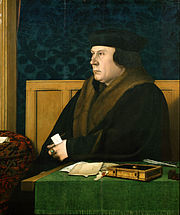The year is 1535. Thomas Cromwell has put aside his lowly origins as the son of a blacksmith and is now chief minister and leading statesman within the court of Henry VIII. He’s fast approaching the height of his career, having found a way for Henry to extricate himself from his childless marriage and uncovered a rich source of new income for the King through sequestration of monastic lands and buildings.
Most books featuring Cromwell concentrate on his work and achievements as lawyer and statesman. What makes Hilary Mantel’s novels about this period different is the way she reveals the man behind the titles and the legislative actions. The Cromwell she shows us, first in Wolf Hall and again in her sequel, Bring up the Bodies, is a complex character. He’s an astute business man with a thriving cloth trade with Flanders derived from relationships built during his years in that country. He’s a politician par excellence, nimbly navigating the myriad jealousies and jostlings for position amongst the gentry and aristocracy that surround the King. But in Mantel’s text he is also a loving and devoted father with a touch of humanity that extends to opening his home to the poor and needy who require food. The man who manipulates young, impressionable men into confessing they committed adultery with Henry’s new queen (Anne Boleyn) is the same man who is moved to tears when he finds the angel wings his dead daughter once wore at Christmas time.
It’s that duality of character that Mantel brings to center stage in Bring up the Bodies, conveying it in a third person narrative style that simultaneously has the intimacy of a first person narrator. Often those moments of character revelation come through short comments made almost en passant.
One such passage occurs when Cromwell is despatched by Henry to see the woman he divorced (Katherine of Arragon) in order to marry Anne Boleyn. Katherine is a problem that will not go away for this royal couple – she refuses to acknowledge the validity of the divorce, refuses to give allegiance to the new queen and is a focal point for Catholic plots against Henry. they need to know whether reports she is dying are true. What Cromwell sees is a shrunken figure of a woman swaddled in an ermine fur cape.
She is jaundiced, and there is an invalid fug in the room – the faint animal scent of the furs, a vegetal stench of undrained cooking water, and the sour reek from a bowl with which a girl hurries away: containing, he suspects the evauated contents of the dowager’s stomach.
Noticing the ermine fur coat in which she is swathed, the pragmatic side of Cromwell’s character comes to the forefront. “The king will want that back, he thinks, if she dies.’ But almost immediately the lens is changed to show his more thoughtful nature as he wonders whether Katherine’s dreams are of the gardens of the Alhambra she left as a young girl:
….the marble pavements, the bubbling of crystal water into basins, the drag of a white peacock’s tail and the scent of lemons. I could have brought her a lemon in my saddlebag, he thinks.
Four months after I closed the book, I could still remember that passage and the way Mantel shows Cromwell’s mind leap from the wizened creature he sees in front of him to a simple action he could have taken to remind her of a better life.
Moments like this abound within the novel. For that reason alone, Mantel for me deserved to win the Man Booker Prize 2012.
First posted at my blog site: http://allthingsbooker.wordpress.com/2012/12/09/review-bring-up-the-bodies/


Always interesting to see how novelists humanize historical figures, the true nature of whom we can only guess at. Sounds like a good series of books.
ReplyDeleteI liked Bring up the Bodies more than Wolf Hall, personally. But they were both fantastic, weren't they?
ReplyDeleteRachel: I agree with you these were extraordinary books. At some point I will just have to read them again - then I might be able to decide which I prefer.
ReplyDeleteHarvee Lau: this is an interpretation of course and who's to say whether it is correct or not. It would be interesting to know what some Tudor historians thought of it. I haven't seen any commentary by them....